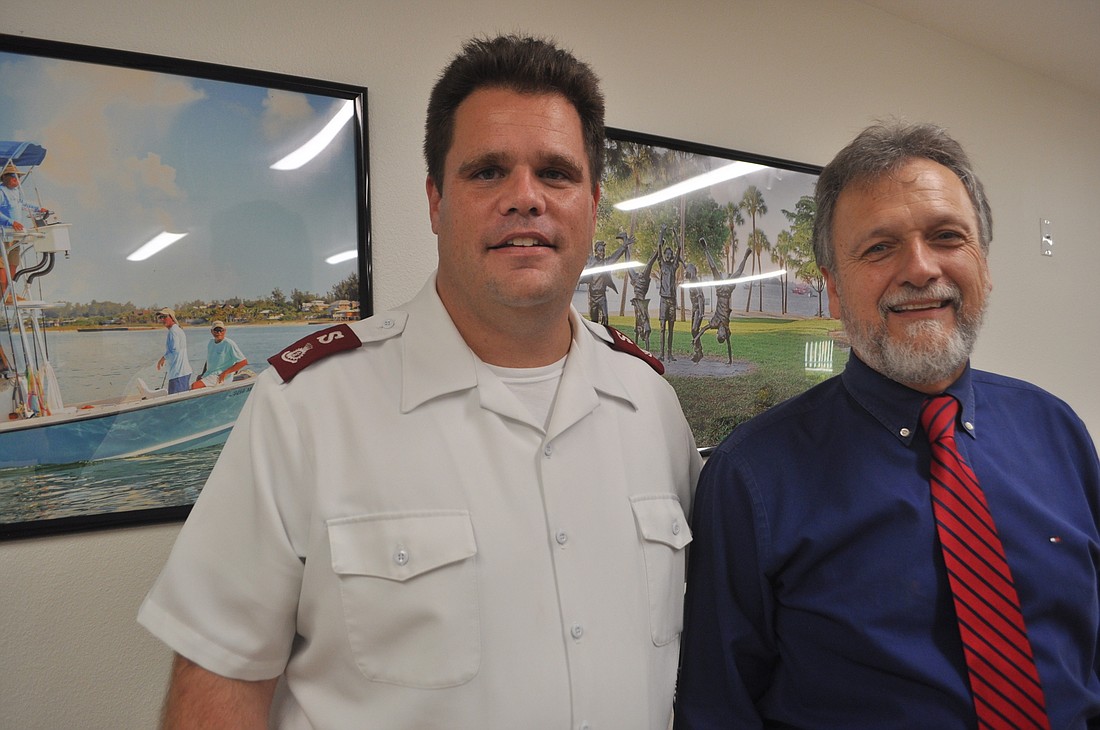- May 3, 2024
-
-
Loading

Loading

Beginning Thursday, the Glasser/Schoenbaum Human Services Center will become the site of the new homeless intake center for the Salvation Army.
With this new facility, dubbed the Quality Life Center, comes a new program, designed to provide individuals with a series of choices as the service provider attempts to steer them toward housing as quickly as possible.
Ethan Frizzell, the major in charge of the Salvation Army in Sarasota, explains that housing is becoming an increasing point of emphasis in the area, and the organization is adjusting in response to that demand.
The new facility will offer those who arrive four weeks of service, free of cost. In the first week, individuals will review subjective quality of life choices — pertaining to physical, material, social and spiritual needs — with a case manager.
This allows the Salvation Army to better tailor programming on a case-by-case basis if an individual seeks further assistance.
“We’ll prescribe services that they can use based on their choices,” Frizzell said. “The reason we’re moving to that is because a behavioral choice model is more cost- and time-efficient in helping people become housed.”
"A behavioral choice model is more cost- and time-efficient in helping people become housed." — Ethan Frizzell
After their first week in the program, individuals will spend the next 21 days working toward a plan of action to get housed. This marks a shift from previous models, Frizzell says, in which service providers would assume what homeless individuals needed. This put them at a disadvantage when individuals acted contrary to those assumptions. The new model is designed to get at their specific needs and desires as quickly as possible.
“Not every person carrying a backpack wants to stay at the Salvation Army or even live in Sarasota,” Frizzell said. “How do we connect them to their preferences earlier so they don’t get trapped in Sarasota or trapped in homelessness?”
Individuals who decline treatment after the first week will be charged 30% of their income to remain sheltered. Frizzell points to studies that say simply offering free shelter and free food actually prolongs homelessness — and he believes the community will accept a program that prioritizes housing people who want help.
As the city and county independently pursue their own strategies for addressing homelessness issues, the Salvation Army is staying flexible when it comes to its future plans. Frizzell anticipates a greater emphasis on housing solutions and that breaking down the homeless population into sub-segments will help service providers more effectively place individuals into homes.
He said both city and county staff members are responsive, but the need to wait on policy direction is a complicating factor when it comes to building a more substantive dialog.
“We communicate with them a lot,” Salvation Army advisory board member Ron Rayevich said. “But we listen to city and county officials, and sometimes it feels that they’ve forgotten we’re there. We’re bearing the brunt of the issue with the homeless — we have for a long time now.”
"We listen to city and county officials, and sometimes it feels that they’ve forgotten we’re there." — Ron Rayevich
As the Salvation Army waits for concrete action from the city or county, it’s positioned to follow through on either governments’ strategy.
Both sides have mentioned the Salvation Army as a critical player in the homelessness conversation, with the county targeting the Salvation Army as a potential 24-hour facility with consolidated services.
The city’s approach runs counter to that, with homelessness director Doug Logan expressing a desire to spread out services so no one area serves as a hub for the homeless population. In addition to the Glasser/Schoenbaum facility, Frizzell said he’s interested in opening other intake portals throughout the county to decentralize the entry system.
“(Frizzell) is a wise man and an articulate man,” Logan said. “If you read what he has been writing lately, he truly understands that the solution is driven by housing”
The city and county commissions are set to meet Nov. 6 to discuss homelessness issues. Even if the two sides are unable to find significant common ground, the Salvation Army is confident the path it’s pursuing now will help get people housed — which is the ultimate goal of combatting homelessness, Frizzell explains.
“What we’re doing is investing in housing solutions instead of investing in homelessness,” Frizzell said.
Not content with the progress made on addressing homelessness in Sarasota, Dan Bridinger is leading a grassroots fundraising effort to help support local service providers.
The Laurel Park resident’s work began when he received funding approval from the Laurel Park Neighborhood Association’s executive board in August. The group agreed to make a donation toward homeless service providers, though the specific organizations the neighborhood will support has not yet been determined.
“Anybody here in Laurel Park goes downtown quite a bit,” Bridinger said. “I think it’s apparent to everybody that there is a problem.”
Bridinger made a broader appeal at the September Coalition of City Neighborhood Associations meeting, calling on those in attendance to put money toward the cause of fighting homelessness.
“What I’d like to see is the citizens, the neighborhoods really actively getting involved with this issue, because it’s not going away,” Bridinger said. “Sarasota is one of the top three wealthiest cities in Florida, and I’d like to see some more help for those people.”
At upcoming Laurel Park Neighborhood Association events, the group will take up a collection to add to the board’s gift. Bridinger hopes that, by calling attention to a widely acknowledged problem, others will be inspired to take concrete action.
“I think sometimes people, if they don’t visualize it, don’t see something tangible — they might not be inclined to react and do something about it,” Bridinger said.